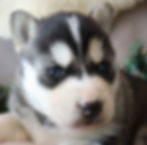When Do Husky Puppies Lose Their Baby Teeth?
- Administrator
- Feb 10
- 3 min read
Updated: Mar 7
Husky puppies are full of energy, curiosity, and, during their teething phase, a strong urge to chew! If you’ve noticed your Husky pup gnawing on furniture, toys, or even your hands, they’re likely going through the natural process of losing their baby teeth. I remember the first time we found a bloody tooth on the floor! We thought our little Husky was facing a real crisis, but it turned out to be the natural teething process. When exactly does this happen, and what can you expect during this stage? Let’s dive into the teething timeline for Husky puppies and how you can help them through it.
Husky Puppy Teething Timeline
Birth to 3 Weeks: No Teeth Yet
Newborn Husky puppies don’t have teeth at birth. During this stage, they rely solely on their mother’s milk for nutrition.
3 to 6 Weeks: Baby Teeth Emerge
Around three weeks old, Husky puppies start getting their baby teeth, also known as deciduous teeth. By six weeks, they typically have a full set of 28 tiny, razor-sharp teeth. At this point, they begin eating soft puppy food as they transition from nursing.
8 to 12 Weeks: Baby Teeth Start Falling Out
Between eight and twelve weeks, a Husky puppy’s baby teeth begin to loosen and fall out as their adult teeth start coming in. You might notice small teeth around your home, or sometimes puppies swallow them while eating, this is normal and nothing to worry about.
12 to 16 Weeks: Permanent Teeth Begin Growing
As their baby teeth fall out, the adult teeth start pushing through the gums. This is when teething discomfort increases, leading to excessive chewing. Providing safe chew toys during this phase is essential to prevent them from targeting furniture, shoes, or hands.
4 to 6 Months: Most Baby Teeth Are Gone
By four months old, most of a Husky puppy’s baby teeth will have fallen out. Their adult teeth, 42 in total, continue growing in, and their jaws become stronger. You may notice red or swollen gums, increased drooling, and a stronger urge to chew during this time.
6 to 7 Months: Teething is Complete
By six to seven months old, all of your Husky puppy’s adult teeth should be in place. At this point, teething-related discomfort will subside, and their chewing habits should become less intense. However, Huskies are naturally playful and mouthy, so providing appropriate chew toys remains important.
Helping Your Husky Puppy Through Teething
The teething phase can be uncomfortable for your pup, but you can help ease the process with these tips:
✔️ Provide Chew Toys: Offer a variety of safe, durable chew toys to satisfy their urge to gnaw.
✔️ Use Frozen Treats: Frozen carrots, ice cubes, or a frozen wet washcloth can help soothe sore gums.
✔️ Avoid Hands and Furniture: Redirect their chewing to appropriate items to prevent bad habits from forming.
✔️ Regular Dental Care: Start brushing your puppy’s teeth early to maintain good oral health and get them used to the process.
When to See a Vet
Most Husky puppies lose their baby teeth naturally, but sometimes, a baby tooth may not fall out on its own (a condition called retained baby teeth). If you notice overcrowding, misaligned teeth, or persistent bad breath, consult your veterinarian to avoid future dental issues.
Final Thoughts
Husky puppies start losing their baby teeth around 8 to 12 weeks old, and by 6 to 7 months, they should have their full set of adult teeth. While teething can be a challenging phase, with the right care and chew toys, you can help your pup transition smoothly. Before you know it, your Husky will be past this stage, ready to flash a big, healthy, toothy grin!
